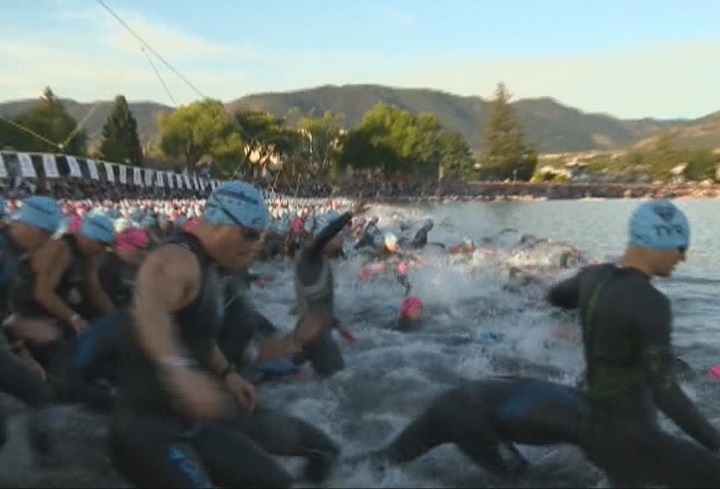Could Ironman Canada be returning to the Okanagan? Maybe, as it appears the City of Penticton is hoping to lure the popular triathlon race back to the region.

On Tuesday, a notable item will be on city council’s agenda: a recommendation that council direct city staff to negotiate a five-year agreement to host Ironman Canada starting in 2020.
The recommendation comes from city staff, and also asks that the race be held annually on the last weekend of August and that the city cough up an annual financial commitment of $410,000.
It also asks that council direct staff to explore opportunities for hosting a future multi-sport event and return to council with options.
WATCH BELOW (Aired Aug. 27, 2015): Penticton Challenge gaining momentum.
From 1983 to 2012, Penticton played host to Ironman, but severed ties with the world-famous brand. The race featured a 3.86-kilometre swim, a 180-km bike ride and a 42-km marathon, and drew a field of approximately 2,500 athletes.

Get daily National news
The staff report said that in 2004, Ironman’s direct economic impact to Penticton at that time was in the range of $12.5 million.
WATCH BELOW (Aired Aug. 25, 2013): First Ironman Whistler
The race then moved to Whistler. According to the city council agenda, from 2012 to 2016, Ironman Canada events in Whistler are estimated to have generated $42 million in economic activity, and that the 2017 event alone had an economic impact of $11.5 million directly to Whistler’s economy.
Penticton has held other multi-sport races since, but none have had the impact Ironman Canada did.
“City staff have been in discussions with Ironman over the past few months regarding the potential return of the full distance race to Penticton in 2020,” the agenda report said.
“Previously bound by a non-disclosure agreement, city staff were tight-lipped about their meetings with Ironman and were unable to provide information or updates to residents or the media until now. Staff proceeded with their due diligence including two face-to-face meetings with an Ironman representative in Penticton, and explored the total cash and in-kind commitments that would be required to bring Ironman back to Penticton.
“This staff report is intended to update the public and city council on the discussions to date.”
The staff report said a public survey was issued to seek community input on future triathlons and events in Penticton. The report said the city received 491 responses including a mix of residents (77 per cent), businesses (8 per cent) and other (15 per cent). The other category included out-of-town athletes and respondents.
The report said about 68 per cent of participants have been here more than eight years and have been involved in one or more of the signature triathlon events including Ironman (64 per cent), Challenge (48 per cent), ITU Multisport (27 per cent) and Super League (15 per cent).
Other responses included:
- About 60 per cent of the residents describe their participation as a spectator followed by volunteer (45 per cent), neighbour of the route (30 per cent), and athlete (29 per cent).
- Of the 40 participants who identified as businesses, nearly half describe their involvement as related to tourism, and a quarter describe their businesses as disrupted by the events.
- More than half of business and residential participants felt that the world-class triathlon event is very important and over 45 per cent said they are very supportive of investing tax dollars to bring these events to the city.
When asked to name three advantages of the event:
- The economic impact it generates;
- The tourism it attracts;
- The international exposure it provides.
When asked to name three disadvantages of the event:
- The traffic it creates;
- The disruption caused by road closure;
- The need for taxpayer funding and questions about the economic impact.
For more on the staff report, click here.







Comments